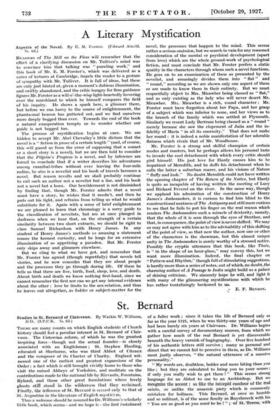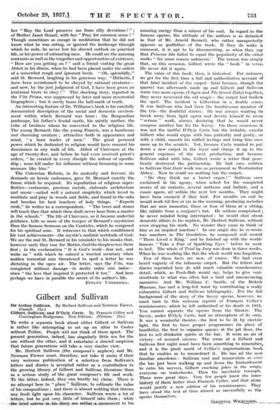St. Bernard
Studies in St. Bernard of Clairvaux. By Watkin W. Williams, D.D. (S.P.C.K. 7s. Gd.)
THERE are many counts on which English students of Church history should feel a peculiar interest in St. Bernard of Clair- vaux. The Cistercian reform, of which he was the greatest inspiring force—though not the actual founder—is closely associated with an Englishman ; St. Stephen Harding, educated at Sherborne, who was third Abbot of .Citeaux and the composer of its Charter of Charity. England wit- nessed one of the earliest and greatest expansions of the Order ; a fact which is still brought vividly home to those who visit the ruined Abbeys of Yorkshire, and meditate on the contributions made to the national life by Rievaubc, Fountains, Byland; and those other great foundations whose lovely ghosts still stand in the wilderness that they reclaimed. Finally, the influence of St. Bernard is second only. to that of St. Augustine in the literature of English mysticifm.
Thus a welcome should be assured forDr. Williams's scholarly little book, which seems—and we hope is—the fist instalment of a fuller work ; since it takes the life of Bernard only as far as the year 1121, when he was thirty-one years of age and had been barely six years at Clairvaux. Dr. Williams begins with a careful survey of documentary sources, from which we gather how much of the real Bernard is yet discoverable beneath the heavy varnish of hagiography. Over five hundred of his authentic letters still survive ; many so personal and direct that we cannot fail to perceive in them, as Dr. Williams most justly observes, " the natural utterance of 'a massive personality."
" My words are, doubtless, bolder and more biting than you like ; 'but they are calculated to bring you to your senses ; if only you really wish to get there I " This seems strong language for an Abbot to use to an Archbishop: But we recognize the accent ; so like the intrepid Candour of the real saints, so- unlike the anaemic piety which is commonly mistaken for holiness.' This Bernard, at once so humble and so militant, is of the same family as Ruysbroeck with his " You are as good- as-you tranf -to- be- ! "-;--of St.-Teresa; with
her " May the Lord preserve me from silly devotions 1 " ; of Mother Janet Stuart, with her " Pray for common sense 1 " Though sometimes so enrapt in meditation that he did not know what he was eating, or ignored the landscape through which he rode, he never lost his shrewd outlook on practical life, or his power of estimating men. He could see the amusing tontrasts aewell as the tragedies and opportunities of existence.
• " How ate you getting on ? " said a friend visiting the great Abbot in his illness, when he had been placed under the orders 'of a- somewhat rough and ignorant leech. " Oh, splendidly," said St: Bernard, laughing in his generous way. "Hitherto, I have been • accustomed to be obeyed by rational creatures— and now, by the 'just judgment of God, I have been given an irrational brute to obey 1" This shocking story, reported in the Vita Prima, was suppressed by later and more reverential
biographers ; but it surely bears the hall-mark of truth. • • An interesting feature of Dr. Williams's book is his carefully documented description of the social and domestic environ- nient within which Bernard was' born : the Burgundian landseape, his father's feudal castle, his saintly mother, the tribe of brothers whom he converted to the religious life. The young Bernard, like the young Francis, was a handsome and charming creature ; attractive both in appearance and mind, " a born leader of men." The great personal power which he dedicated to religion would have ensured his dominance in any walk of life. Abbot of Clairvaux at the age of twenty-five, and before he had even received priest's orders, " he created in every disciple the ardour of apostle- ship ; none fell under his influence without becoming in some Measure like him."
The Cistercian Reformn, in its austerity and fervour, its deniands on heroic endurance, gave St. Bernard exactly the frame which he required. Its repudiation of religious super- iluities—vtstments, precious metals, elaborate architecture and music—suited well a natural simplicity which loved to Meditate and pray in woods and fields, and found in the oaks and beeches his best teachers of holy things. " Experto crede," he writes to a correspondent. The trees and stones Will teach thee that which thou shalt never hear from a master in the schools." The life of Clairvaux, as it became under his guidance, tells us more of the temper of Bernard's mysticism than the famous Sermons on the Canticles, which he composed for his spiritual sons. It witnesses to that which conditioned his vast achievements—the mystic's realistic certitude of God. We see the real St. Bernard in his reminder to his monks that, however early they rose for Matins, Godthe sleepless was there first ; in the exclamation " It is God's work—fear not, and write on " with which he calmed a worried secretary when sudden torrential rain threatened to spoil a letter he was dictating in the open air. The letter, says the Vita, was completed without damage—in medio imbre sine imbre--- since " the love that inspired it protected it too." And here perhaps we have in parable the secret of its author's life.
EVELYN UNDERHILL.



























































 Previous page
Previous page